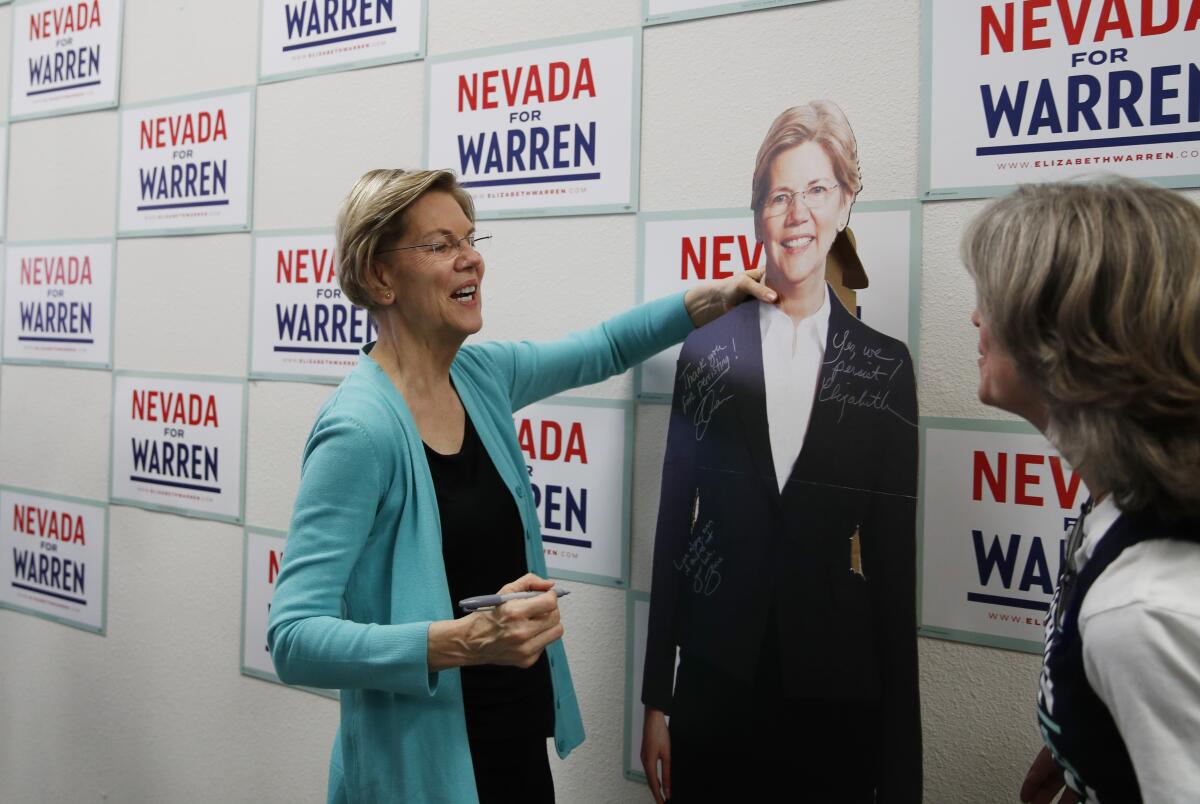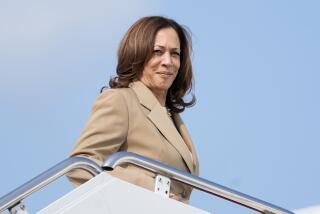After a strong debate, Elizabeth Warren scrambles to get back into contention

NORTH LAS VEGAS, Nev. — Sen. Elizabeth Warren scrambled Thursday to take advantage of what her supporters — and even some rivals — saw as a highly effective debate performance, but faced continued questions about whether she has time to get her presidential campaign back into contention as her ideological soulmate, Sen. Bernie Sanders, tightens his grip on front-runner status.
Warren’s campaign said it pulled in $2.8 million in donations in one day Wednesday — her largest one-day fundraising haul and even more than the $2.7 million the Sanders campaign says it raised. That fired up supporters who had been disappointed by her fourth-place finish in the New Hampshire primary and debate performance there that many saw as lackluster.
“All I can say is we’re just getting started,” a pumped-up Warren said in North Las Vegas on Thursday morning as her supporters chanted her signature slogan, “Persist! Persist!”
But it is late to be “getting started” in a race whose pace is quickening, at a time when many Democrats are questioning whether any candidate can slow or stop Sanders, who is consolidating the support of progressive Democrats while center-left voters are splitting their votes among a number of candidates.
Warren has been lagging in polls in the large swath of states — including California — that will vote over the next two weeks, appearing in fourth place in several states. Roughly 40% of all convention delegates will be allocated during that period.
“She had a very good performance, but the history of these debates is that they have not done much to change poll numbers,” said Mark Mellman, a Democratic strategist who is not supporting a candidate but is heading a political action committee that has run anti-Sanders ads.
He cited the example of Sen. Kamala Harris of California, who early in her presidential campaign got a big burst of donations and media attention after a pointed attack on former Vice President Joe Biden’s civil rights record. That buzz quickly faded, and Harris dropped out of the race in December.
As Warren enjoyed the cheers of energized supporters, former New York Mayor Michael R. Bloomberg, who was widely seen as the chief loser in Wednesday night’s debate, returned to his strong suit on Thursday — intimidating financial force. His campaign released spending figures ahead of a federal disclosure deadline showing that he had spent $409 million through the end of January and already had 2,400 people on his campaign staff.
“Mike is the only candidate with the record and resources to build the national infrastructure Democrats need to beat Donald Trump,” campaign manager Kevin Sheekey said in a statement.
Wednesday’s debate, which marked Bloomberg’s first turn on the stage, drew record viewership, just short of 20 million people, according to Nielsen. Bloomberg’s lackluster debut could cost him support from voters who are still taking the measure of a candidate who entered the race late and has been known to most Democrats only through the ubiquitous television and digital ads he has financed with his personal fortune.
Former South Bend, Ind., Mayor Pete Buttigieg, speaking at a town hall at USC, said Bloomberg had suffered by his decision to enter the race late and skip the early contests.
“What I think Mike Bloomberg missed out on was a year of going into environments where voters are kicking the tires on your ideas,” Buttigieg said. “If you haven’t had that, it shows.”
Biden also continued to lash out at Bloomberg on Thursday, notably for the billionaire’s television ads that feature former President Obama praising him.
“He’s advertised himself to be Barack’s best buddy,” Biden said during a CNN town hall at the Sahara resort in Las Vegas. “You’d think Barack endorsed him.”
During the debate, Bloomberg proved to be the perfect foil for Warren, who has built her campaign around denouncing the undue political and economic influence of the wealthy.
Warren’s supporters were delighted to see her returning to the fighting spirit that drove her rise to the top of many polls last summer and fall, before the rollout of her healthcare policy fell flat. Her support in polls tumbled after that; Sanders — even after he suffered and recovered from a heart attack — was a big beneficiary.
She came in a disappointing third in the Iowa caucuses and fourth in the New Hampshire primary.
To get back in the game in Wednesday’s debate, Warren shelved her past reluctance to attack her rivals by name. She lacerated Bloomberg by portraying him as a sexist billionaire; gave withering critiques of her rivals for center-left voters, Sen. Amy Klobuchar of Minnesota and Buttigieg; and portrayed Biden as too cozy with Senate Majority Leader Mitch McConnell (R-Ky.).
“Last night was amazing!” said Connie Piro, 62, a retired Mandalay Bay hotel waitress, at Warren’s rally Thursday. “I was so happy the whole time. I was going, ‘Yes! Yes! Yes! Yes!’”
Piro said she had been concerned that Warren was slipping in the polls, but believes her debate performance will reverse that trend.
“I think it really helped a lot, I really do,” said Piro, one of about 150 people who packed into a small Warren field office before heading out to canvass for her.
“She demonstrated that she can stand up to these men and put them in their place where they belong.”
Other supporters, concerned about Warren’s slide, have formed a super PAC and have poured money into ads supporting her. The group, Persist PAC, has spent $795,724 in Nevada — more than any outside political group — according to Advertising Analytics, a firm that tracks political ad buys.
The super PAC’s activity runs counter to Warren’s opposition to such outside funding groups, and clashes with her marquee promise to finance her own campaign solely with grass-roots donations. But in a sign of the financial pressures on her campaign, Warren has refused to renounce the organization.
Asked about the shift of position, Warren said Thursday that she would not ask the group to stop its ads because she was not facing a fair fight with the many other candidates who are benefiting from super PAC support.
“All the men who were on the stage all had either super PACs or they were multibillionaires who could rummage around in their sock drawers and find enough money to be able to fund a campaign,” she told reporters Thursday. “If all candidates want to get rid of super PACs, count me in — I’ll lead the charge. But that’s how it has to be. It can’t be the case that a bunch of people keep them and only one or two don’t.”
Sanders criticized Warren for her change of position, though not by name: “You can’t change a corrupt system by taking its money. I am proud to be the only non-billionaire in this race without a super PAC spending millions of dollars to support me.”
Although Sanders argues that he does not have a super PAC in his corner, he has received significant backing from the super PAC affiliated with National Nurses United, which has spent hundreds of thousands on his behalf. Buttigieg has backing from the Vote Vets PAC. Biden has had a super PAC acting on his behalf since late last year, and backers of Klobuchar recently launched one as well.
By law, super PACs can take unlimited donations, which campaigns cannot do. They can’t coordinate directly with a campaign, but they are typically run by people with close ties to the candidate, as is the case with the Persist PAC.
The Warren campaign said the donations that poured directly into its coffers on Wednesday included $1 million that came in during the debate itself. By midafternoon Thursday, Warren said on Twitter, it had received $5 million from the moment she stepped onto the debate stage.
Her campaign also said it had raised $17 million so far this month — a strong showing compared with the end of 2019, when she raised $21 million over three months.
Replenishing their coffers has become crucial for all the major candidates other than Bloomberg. Buttigieg’s campaign, for example, reported that it had rapidly drained cash in January, ending the month with $6.6 million — less than half as much as it had when the month started.
During her town hall with CNN on Thursday night, Warren was asked to name potential running mates. She said that discussion was premature, but then spoke glowingly of Harris and Julián Castro, who served as Housing secretary under Obama and has stumped for Warren, including in Nevada.
Warren is not the only candidate looking to revive her fortunes in Nevada; Biden also hopes for a strong showing here and in South Carolina, which votes in just over a week. He focused on his efforts to combat gun violence, speaking at an event with families of people killed in shootings.
Mehta reported from North Las Vegas and Hook from Washington. Times staff writer Michael Finnegan in Los Angeles contributed to this report.
More to Read
Get the L.A. Times Politics newsletter
Deeply reported insights into legislation, politics and policy from Sacramento, Washington and beyond. In your inbox three times per week.
You may occasionally receive promotional content from the Los Angeles Times.












